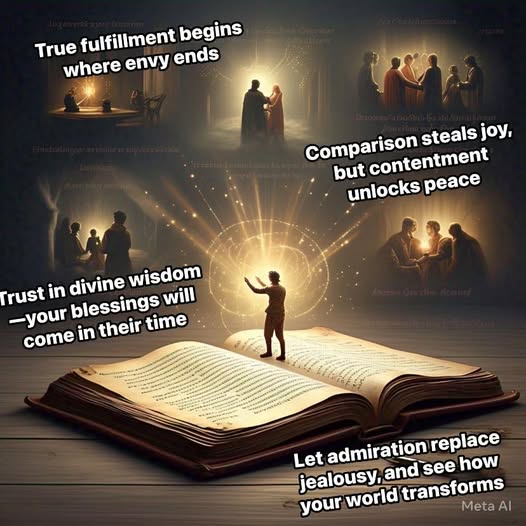
Kavi had long observed a recurring human behavior that sows discord and hinders personal growth: envy. In his community, he noticed that many individuals, instead of appreciating their own blessings, constantly compared themselves to others. This relentless envy fueled discontent and resentment, fracturing relationships and undermining the social fabric.
Kavi saw a stark contrast between two ways of living. On one side, envy—a corrosive emotion that gnaws at the heart and breeds isolation. On the other side, contentment—a serene state of mind rooted in gratitude, trust in divine wisdom, and acceptance of life’s unique journey.
The Envy Dilemma
Kavi observed that:
Comparative Discontent: Those consumed by envy always felt they were lacking, as their focus remained fixed on what others had rather than on their own inherent worth.
Social Discord: Envy fostered feelings of bitterness and competition, leading to conflicts and estrangement among neighbors, friends, and even family members.
Spiritual Drift: Instead of nurturing their inner selves, envious individuals lost sight of the greater purpose and the spiritual guidance offered by prophets and messengers, which advocates for contentment and humility.
The Contentment Advantage
In contrast, Kavi admired those who embodied contentment:
Gratitude Over Comparison: Content individuals celebrated their own blessings and took joy in the successes of others, recognizing that each person’s journey is unique.
Inner Peace: By trusting in divine wisdom and accepting their circumstances, they cultivated a tranquil state of mind that bolstered resilience and unity.
Community Harmony: Their appreciation for life’s gifts helped create a supportive and harmonious environment, where mutual respect and compassion flourished.
The Framework for Cultivating Contentment
Determined to help his community overcome the corrosive effects of envy, Kavi proposed a framework for nurturing contentment:
Embrace Gratitude:
Regularly reflect on and acknowledge the blessings in your life. A grateful heart naturally wards off the poison of envy.
Avoid Unnecessary Comparisons:
Recognize that every individual’s path is unique. Rather than measuring your worth against others, focus on your personal journey and growth.
Trust in Divine Wisdom:
Have faith that what is destined for you will come in its own time. Every blessing is tailored to each individual’s needs, and that true satisfaction comes from accepting God’s plan.
Celebrate Others’ Successes:
Transform envy into admiration by rejoicing in the achievements of those around you. Let their success inspire you rather than diminish your own self-worth.
Engage in Self-Reflection:
Regularly examine your thoughts and feelings. Understand the root causes of any envy and work consciously to replace it with contentment and gratitude.
The Lasting Impact
Kavi’s insights on envy and contentment resonated deeply within his community. As more individuals adopted his framework, they discovered that true happiness and social harmony are found not in comparing oneself to others, but in embracing one’s own blessings with gratitude and trust. In doing so, the destructive cycle of envy began to dissolve, giving way to a spirit of unity, mutual support, and lasting inner peace.
Through his teachings, Kavi reminded everyone that the pursuit of contentment is a powerful act of self-liberation—a path that leads to spiritual fulfillment and transforms not only individual lives but the entire community. By cultivating gratitude and trusting in the divine plan, one can transcend envy and unlock the serene potential that lies within.

